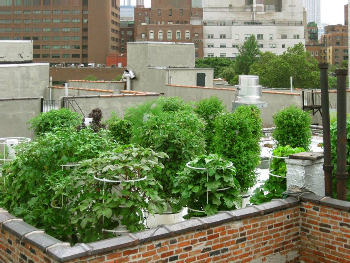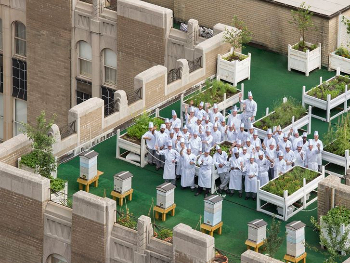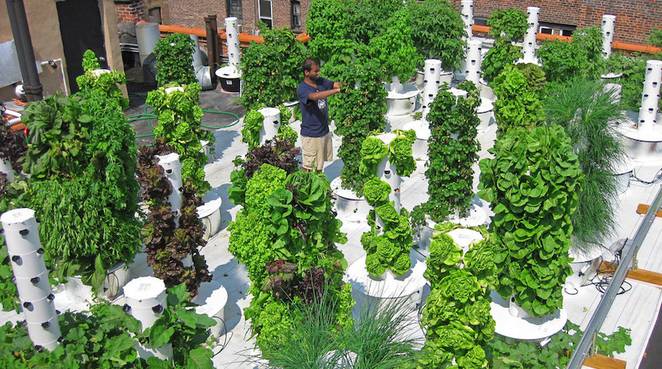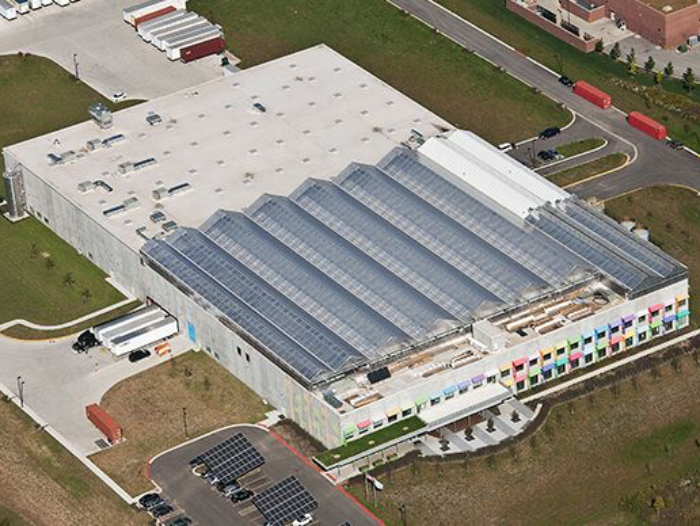 Credit: Los Angeles Times
Credit: Los Angeles Times
Rooftops in big cities are valuable real estate. You wouldn’t know it standing at street level, but there is a lot of urban gardening going on among the skyscrapers. City dwellers have had their own little gardens for years, but restaurants that have roof access are now harvesting their own produce more and more. The wonderful benefit is that your plate can be filled with herbs, vegetables and fruits that were picked just hours earlier. This brings the meaning of fresh, local, and sustainable to a whole new level.
 Credit: Bell, Book & Candle
Credit: Bell, Book & Candle  Credit: Waldorf-Astoria
Credit: Waldorf-Astoria
One of the pioneers of restaurant rooftop gardening is
Bell, Book & Candle in Manhattan. Their roof houses a large, organic, soil free aeroponic garden. The menu here is seasonal and heavily influenced by the large variety of vegetables grown onsite. They use a pulley system to lower the produce from the private garden to the restaurant below.
The Waldorf-Astoria in New York City, which is closed at the moment for renovations, had a roof top garden and apiary for many years, even before it was the “in” thing. Their garden was filled with about 40 varieties of produce with such items as strawberries, lettuce, lavender, figs and apples. The apiary housed 360,000 European honeybees. Honey that was harvested from their apiary was also used in the hotel’s spa treatments, as well as in the kitchen. They hope to have a bigger and better garden upon reopening.
 Credit: LA Urban Farms
Credit: LA Urban Farms
Going vertical. The popularity of rooftop vertical aeroponic tower farms is growing from coast to coast. Los Angeles based
LA Urban Farms is a full service urban produce grower that utilizes the patented Tower Garden technology. They work with clients to install tower systems on the roofs of homes, markets, businesses, universities, hotels, resorts, etc. Besides the benefit of utilizing 90% less space, they also use 90% less water than a traditional garden. This is extremely helpful in a place like Southern California where not only is space an issue, so are the water restrictions. Tower farms also require less maintenance time and the bounty harvests in a shorter time, without the use of harmful herbicides and pesticides.
 Credit: Gotham Greens
Credit: Gotham Greens
Go big or go home. Gotham Greens recently opened the “world’s largest rooftop farm” on Chicago’s South Side. Their fourth greenhouse facility, and first venture outside of New York, is 75,000 square feet and is powered completely by renewable energy. It sits atop a Method manufacturing facility in the historic Pullman area. Markets and grocery stores in the area benefit from the locally grown items, as well as various food networks and nonprofit organizations that Gotham Greens partners with, providing them with premium quality produce year round.